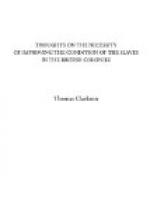property of their masters must be injured also.
Forced labour, again, sends many of them to the sick-houses.
Here is, at any rate, a loss of their working time.
But it drives them also occasionally to run away,
and sometimes to destroy themselves. Here again
is a loss of their working time and of property into
the bargain. Forced labour, then, is one of
those striking parts in the West Indian husbandry,
in which we see a constant source of loss to
those who adopt it; and may we not speak, and yet
with truth, as unfavourably of some of the other striking
parts in the same system? What shall we say, first,
to that injurious disproportion of the articles of
croppage with the wants of the estates, which makes
little or no provision of food for the labourers (the
very first to be cared for), but leaves these to
be fed by articles to be bought three thousand miles
off in another country, let the markets there be ever
so high, or the prices ever so unfavourable, at the
time? What shall we say, again, to that obstinate
and ruinous attachment to old customs, in consequence
of which even acknowledged improvements are almost
forbidden to be received? How generally has the
introduction of the plough been opposed in the West
Indies, though both the historians of Jamaica have
recommended the use of it, and though it has been
proved that one plough with two sets of
horses to relieve each other, would turn up as
much land in a day, as one hundred Negroes
could with their hoes! Is not the hoe also continued
in earthing up the canes there, when Mr. Botham proved,
more than thirty years ago, that two men would
do more with the East Indian shovel at that sort of
work in a day, than ten Negroes with the former
instrument? So much for unprofitable instruments
of husbandry; a few words now on unprofitable modes
of employment. It seems, first, little less
than infatuation, to make Negroes carry baskets of
dung upon their heads, basket after basket, to the
field. I do not mention this so much as an intolerable
hardship upon those who have to perform it, as an
improvident waste of strength and time. Why are
not horses, or mules, or oxen, and carts or other
vehicles of convenience, used oftener on such occasions?
I may notice also that cruel and most disadvantageous
mode of employment of making Negroes collect grass
for the cattle, by picking it by the hand blade by
blade. Are no artificial grasses to be found in
our islands, and is the existence of the scythe unknown
there? But it is of no use to dwell longer upon
this subject. The whole system is a ruinous one
from the beginning to the end. And from whence
does such a system arise? It has its origin in
slavery alone. It is practised no where
but in the land of ignorance and slavery. Slavery
indeed, or rather the despotism which supports slavery,
has no compassion, and it is one of its characteristics
never to think of sparing the sinews of the wretched




